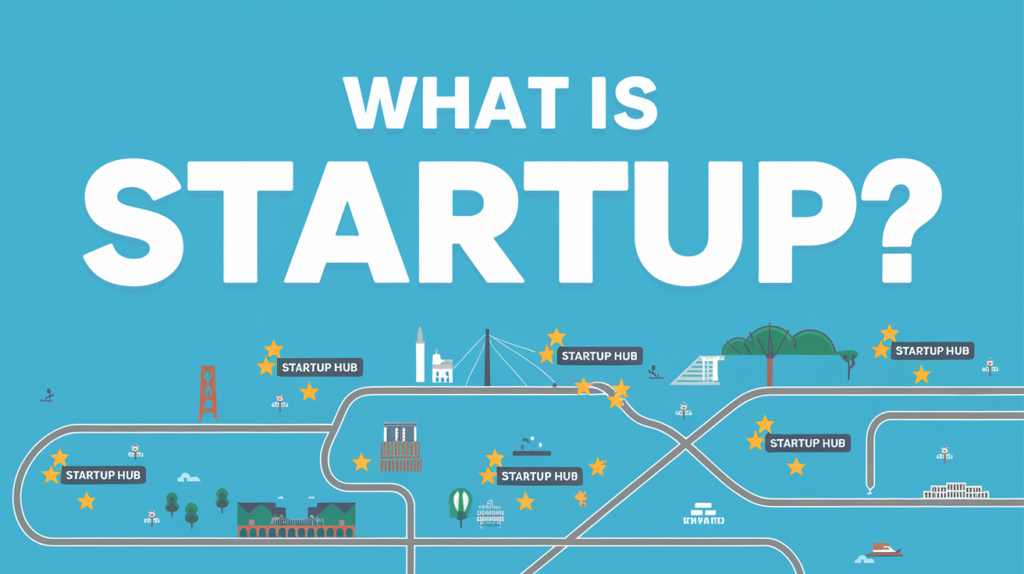What is Startup?

A startup is a new business venture created to bring innovative solutions to the market. These businesses are typically young, fast-growing companies that develop scalable models. They often disrupt industries through creativity and risk-taking. In today’s economy, startups play a significant role in driving innovation, creating jobs, and advancing technology.
Table of Contents
Characteristics
- Innovation and Creativity
Startups often introduce new technologies or ideas that solve specific market problems. They focus on unique products or services that don’t yet exist or improve on existing offerings. - High Growth Potential
They have the potential for rapid expansion. With the right strategy and product-market fit, they can grow significantly in a short time, reaching larger markets. - Lean Business Model
These businesses operate with a lean structure, minimizing expenses and maximizing efficiency. This allows them to quickly adapt to changes and test new ideas with minimal resources. - Uncertainty and Risk
Startups often face uncertainty as they test out their products, business models, and customer bases. While there’s great potential for success, they also come with significant risks.
Lifecycle
- Ideation and Concept
They begin with an idea that aims to solve a particular problem. This phase involves defining the product or service and identifying the market gap it fills. - Market Research and Validation
Founders must validate their idea by researching the market. Understanding the competition, customer needs, and demand is critical for long-term success. - Product Development
After validation, the product is developed. This stage often includes creating prototypes, gathering feedback, and refining the solution. - Launch and Growth Stage
Once the product is ready, the startup launches. The focus shifts to acquiring customers, building brand awareness, and improving the offering based on user feedback. - Scaling or Exit Strategy
At this point, the company may either scale by expanding operations or consider an exit, such as selling to a larger company or going public.
Types
- Scalable
These businesses are designed for rapid growth, often targeting national or global markets. They rely heavily on external funding for expansion. - Small Business
These are traditional businesses that serve a specific local or niche market. They may not have the same growth ambitions as scalable startups. - Lifestyle
Lifestyle startups are created to support the founder’s passion and desired lifestyle, focusing more on sustainability than high growth. - Social
Social enterprises aim to solve societal issues while generating profit. They prioritize making a positive social impact alongside financial success.
Advantages
- Innovation and Disruption
Startups have the ability to introduce fresh ideas, often disrupting existing markets and industries. Their agility allows them to quickly adapt to changes and consumer needs. - Autonomy and Creative Control
Founders have significant control over the direction of the business, allowing for flexibility and the implementation of creative solutions. - Rapid Growth Opportunities
With the right product, startups can experience rapid growth, gaining market share faster than traditional businesses. - Job Creation and Team Building
Startups contribute to the economy by creating new jobs, offering employees the chance to be part of a dynamic and innovative team.
Disadvantages
- Financial Risk and Uncertainty
Startups often operate with limited resources, making them financially vulnerable. Many new businesses fail within their first few years due to financial instability. - Competitive Market Challenges
They frequently compete with established companies, making it challenging to stand out. They must offer something unique to survive in competitive markets. - Legal and Regulatory Issues
Navigating legal requirements and compliance can be complicated and expensive, especially for startups entering highly regulated industries. - Workload and Stress Factors
Founders and early employees often work long hours under high pressure, which can lead to burnout and stress.
Funding a Startup
- Bootstrapping
Many founders fund their businesses through personal savings, a method known as bootstrapping. This allows full control but can slow down growth due to limited resources. - Angel Investors
Angel investors provide early funding in exchange for equity. These investors also offer mentorship and valuable business advice. - Venture Capital
Startups aiming for fast growth often seek venture capital. Venture capitalists provide large amounts of funding in return for equity and can help drive the business forward. - Crowdfunding
Crowdfunding platforms allow startups to raise money from the public, especially useful for consumer-focused products that generate widespread interest.
Success Stories
- Airbnb
Airbnb transformed the travel industry by allowing homeowners to rent out their spaces to travelers. It grew from a small idea into a global company valued at billions. - Uber
Uber disrupted the transportation industry, offering a mobile app that connects riders and drivers. Its rapid growth positioned it as a global leader in ride-sharing.
Lessons from Failed
- Lack of Product-Market Fit
Many startups fail because they cannot find a market for their product. Ensuring there’s demand is essential for long-term success. - Running Out of Cash
Poor financial management or overly aggressive scaling often leads to cash flow problems, causing businesses to shut down.
Challenges
- Finding a Product-Market Fit
Identifying whether there’s a need for the product or service is one of the biggest challenges new businesses face. Without demand, even innovative ideas may fail. - Securing Funding
Raising capital is often a significant challenge. Startups need to find the right investors and funding sources to sustain operations and grow. - Building the Right Team
Assembling a skilled, motivated team is crucial for success. The right team can help bring the founder’s vision to life and drive the business forward. - Marketing and Customer Acquisition
They must develop effective marketing strategies to acquire and retain customers. Building brand awareness is essential for growth and sustainability.
Conclusion
They are a vital part of the modern business landscape, fostering innovation, job creation, and market disruption. Despite the risks, startups offer exciting growth opportunities and have the potential to reshape industries. For aspiring entrepreneurs, understanding the characteristics, lifecycle, and challenges of startups is key to success.
Read more Topics: Click Here
This content Research by : Branding Ninja



Pingback: How to start up a company in India
Pingback: Types of Investors